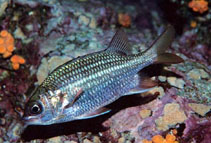| Family: |
Holocentridae (Squirrelfishes, soldierfishes), subfamily: Holocentrinae |
| Max. size: |
25.4 cm TL (male/unsexed) |
| Environment: |
demersal; marine |
| Distribution: |
Eastern Pacific: Gulf of California to Ecuador, including the Galapagos Islands. |
| Diagnosis: |
Dorsal spines (total): 11-11; Dorsal soft rays (total): 13-14; Anal spines: 4-4; Anal soft rays: 8-9; Vertebrae: 27-27. Body deep and somewhat compressed; caudal peduncle narrow; eyes large; pelvic fins with 1 spine and 7 soft rays (I, 7); preopercle with small serrations and a large, pointed spine at the angle; body violet pink; back bronze (Ref. 55763). Branchiostegal rays: 8-8 (Ref. 36626). |
| Biology: |
Adults hide in small caves or in crevices and cracks of rocks during the day. At night, they feed on small crustaceans in the intertidal zone, less than 3 m in depth. Oviparous, with planktonic larvae (Ref. 36626). Appear only occasionally in markets where it is sold fresh. |
| IUCN Red List Status: |
Least Concern (LC); Date assessed: 24 May 2007 Ref. (130435)
|
| Threat to humans: |
harmless |
Source and more info: www.fishbase.org. For personal, classroom, and other internal use only. Not for publication.

